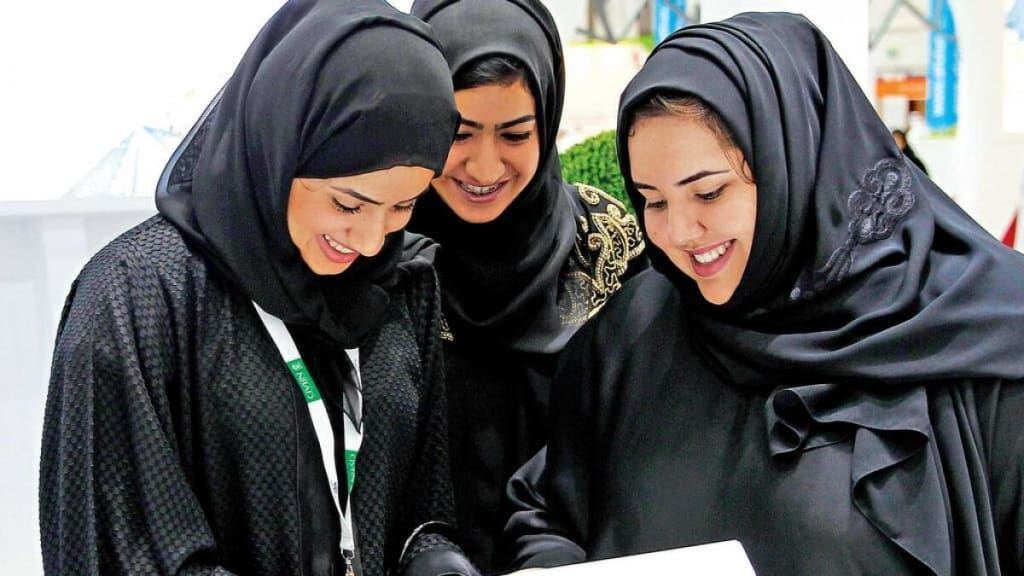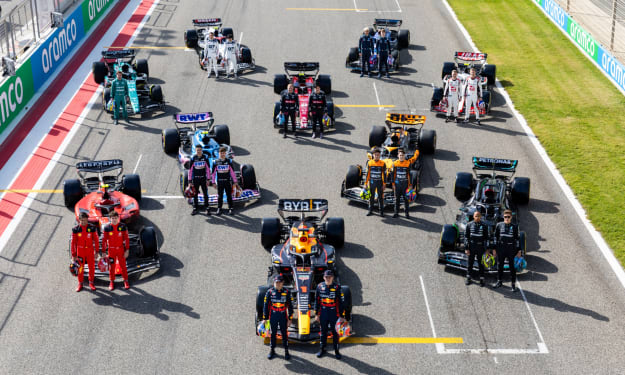Content warning
This story may contain sensitive material or discuss topics that some readers may find distressing. Reader discretion is advised. The views and opinions expressed in this story are those of the author and do not necessarily reflect the official policy or position of Vocal.
"Navigating the Perception Divide: Europe's Complex Relationship with the Global South"
"Balancing Allure and Alliances: Saudi Arabia's Complex Dance Between Western Lifestyle and Chinese Trade"

In an era characterized by geopolitical tensions and shifting alliances, the world is closely watching Europe, with opinions about the European Union (EU) and the United States reflecting a complex tapestry of inconsistent attitudes, particularly from the Global South. Among the nations in focus, Turks, Saudis, and South Africans find themselves straddling a delicate balance—yearning for the allure of Western life while simultaneously harboring geopolitical aspirations that align more closely with Moscow and Beijing.
The discourse surrounding Europe's standing in the global arena has been punctuated by accusations of hypocrisy, casting a shadow over the West's reputation in the eyes of the Global South. The genesis of these allegations can be traced back to Russia's incursion into Ukraine almost two years ago, a watershed moment that triggered a cascade of criticisms directed at Europe. One recurrent claim is that Europeans are selective in their compassion, purportedly showing greater concern for war victims and refugees when they share certain characteristics, such as being "light-skinned" like the Ukrainians.
Critics have also pointed to what they perceive as a discernible pattern in Europe's approach to autocracies, where rulers in European neighborhoods deemed "useful" receive a measured and cautious response. This selective treatment, according to detractors, raises questions about the consistency of Western nations in upholding democratic values and human rights, often suggesting that economic interests take precedence over principled stances.
The contentious issue of Western support for Israel has further fueled the narrative of double standards. Critics argue that the EU and the US, while advocating for human rights elsewhere, exhibit a degree of inconsistency when it comes to their stance on Israel, suggesting a readiness to overlook alleged violations in the name of geopolitical alliances. This perceived inconsistency in dealing with state-sanctioned violence has become a focal point for those scrutinizing Europe's commitment to universally applied ethical standards.
A recent global survey conducted by the European Council on Foreign Relations (ECFR) sheds light on these dynamics. While accusations of Western hypocrisy are not novel, the survey reveals a nuanced and intricate picture. Non-Europeans, the survey suggests, are not immune to inconsistencies themselves, challenging the notion that geopolitical viewpoints from the Global South are uniformly principled.
Within this complex landscape, the attitude of Turks, Saudis, and South Africans stands out as particularly intriguing. Despite a desire to partake in the prosperity and lifestyle associated with the West, these nations express a simultaneous inclination to align with Moscow and Beijing on geopolitical matters. This duality underscores the intricate dance of interests and values in the Global South's relationship with Europe.
The perception divide highlights the need for a deeper understanding of the intricate geopolitical dynamics at play. Europe, facing accusations of decline and predictions of failure, must navigate this terrain with a nuanced appreciation of the diverse perspectives emanating from the Global South. As the world watches, Europe finds itself at a crossroads, where recalibrating its approach to international relations becomes not just a strategic imperative but a moral one.
To address these challenges, Europe must engage in open dialogue with nations in the Global South, fostering a mutual understanding of concerns and aspirations. A recalibration of foreign policies, with a renewed commitment to consistency in upholding democratic values and human rights, can help bridge the perception gap.
In conclusion, Europe's standing in the eyes of the Global South is a multifaceted and evolving narrative. Accusations of hypocrisy, selective treatment, and double standards are complex issues that demand nuanced analysis. As Europe grapples with its role in the world, it must navigate these challenges with an awareness of the intricate geopolitical tapestry that defines its relationship with the Global South.
In the heart of the Arabian Peninsula, Saudi Arabia finds itself at the crossroads of tradition and modernity, where the allure of the Western lifestyle clashes with the pragmatic pull of economic ties with China. In a juxtaposition that reflects the intricate dynamics of global affairs, Saudis, while enamored with Western luxuries and cultural influences, demonstrate a clear preference for fostering economic partnerships with China.
The popularity of the Western lifestyle in Saudi Arabia is undeniable. From fashion to entertainment, and culinary trends to technological advancements, the Saudi youth, in particular, has embraced the allure of Western modernity. The skylines of cities like Riyadh and Jeddah are adorned with symbols of progress and luxury, echoing the global influence of Western cultural exports.
However, behind the facade of this cultural convergence lies a strategic economic calculus that sees Saudi Arabia increasingly turning its gaze toward the East, with China emerging as a key trade partner. The Belt and Road Initiative (BRI) has played a pivotal role in fostering economic ties between the two nations. As the world's largest importer of oil, China's appetite for energy resources aligns seamlessly with Saudi Arabia's status as a leading oil exporter. This mutual interest has paved the way for substantial economic cooperation, with trade and investment flourishing in recent years.
The shift towards strengthening ties with China is not merely an economic transaction; it is a strategic recalibration that acknowledges the shifting global power dynamics. While the allure of Western commodities remains strong, Saudi Arabia recognizes the diplomatic and economic benefits of diversifying its partnerships. The Belt and Road Initiative, with its ambitious infrastructure projects and economic collaboration, presents an opportunity for Saudi Arabia to expand its influence and navigate the evolving landscape of international relations.
This nuanced approach reflects the Kingdom's understanding of the global geopolitical chessboard. As it embraces Western ideals in lifestyle and culture, Saudi Arabia is concurrently building bridges with China, a nation that offers economic opportunities and political partnerships that resonate with the Kingdom's long-term strategic vision.
The Saudi preference for trading with China does not necessarily signal a rejection of the West. Rather, it underscores the pragmatic approach adopted by Saudi leaders in navigating a world where economic prowess and geopolitical influence are intricately intertwined. While Western nations remain key allies and sources of inspiration, Saudi Arabia is adeptly diversifying its economic portfolio to ensure stability and growth in an ever-shifting global landscape.
In conclusion, Saudi Arabia's embrace of the Western lifestyle and simultaneous preference for economic ties with China encapsulates the delicate dance many nations engage in on the world stage. As the Kingdom balances tradition and progress, allure and alliances, it exemplifies a strategic approach that recognizes the complexity of contemporary global relations. In this evolving narrative, Saudi Arabia emerges not as a passive spectator, but as a proactive player, skillfully navigating the nuances of a multipolar world.
About the Creator
Enjoyed the story? Support the Creator.
Subscribe for free to receive all their stories in your feed. You could also pledge your support or give them a one-off tip, letting them know you appreciate their work.





Comments
There are no comments for this story
Be the first to respond and start the conversation.